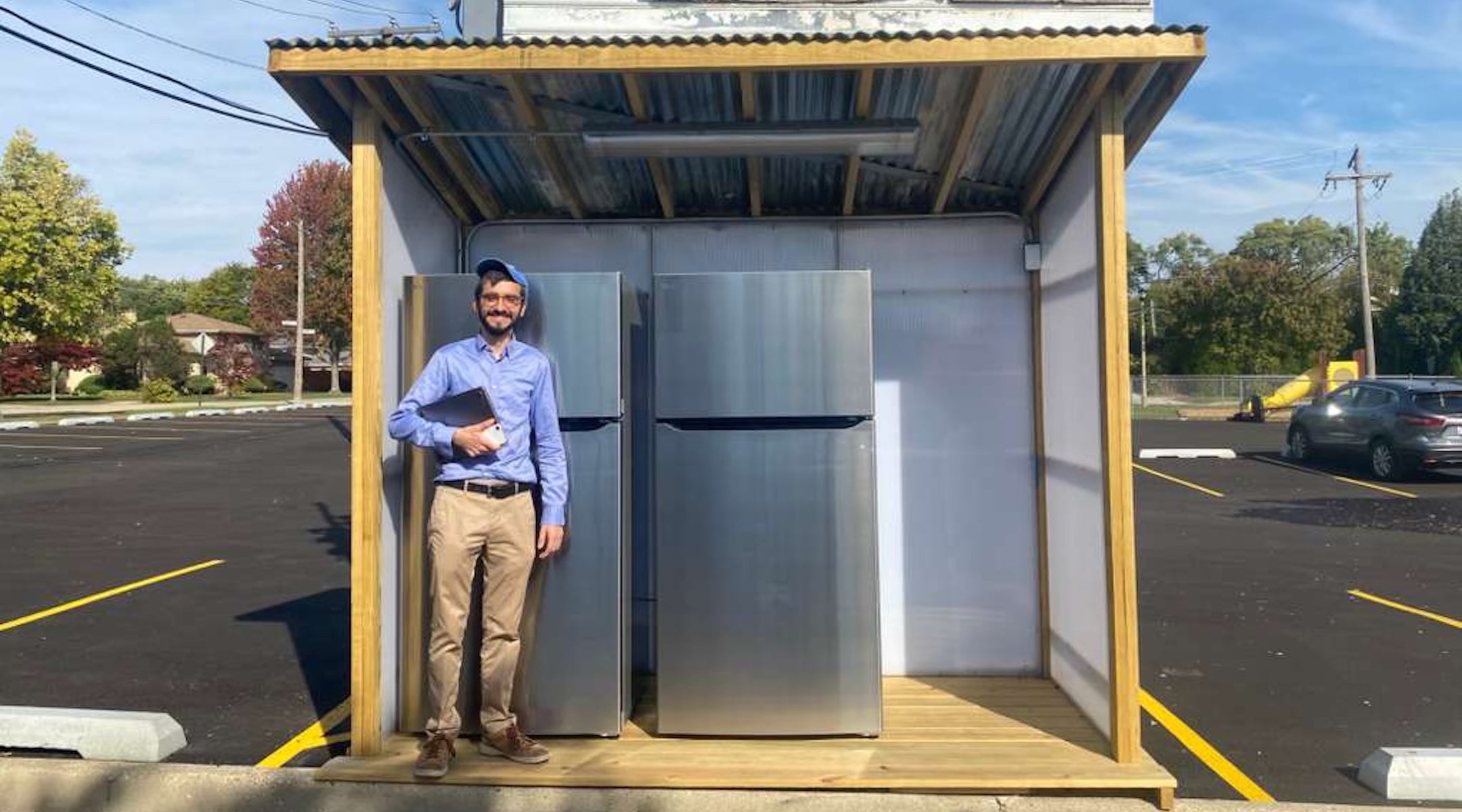This article was produced as part of (JEWISH REVIEW)’s Teen Journalism Fellowship, a program that works with Jewish teens around the world to report on issues that affect their lives.
SKOKIE, Illinois — Just off East Prairie Road in this suburb of Chicago is a sign that says, “Welcome to Hersh’s Fridge.” At the bottom is a line in Aramaic, quoting the Passover Haggadah: “Let all who are hungry come and eat.”
It may not look like much, but the sign points to a pioneering project: an outdoor kosher community fridge that offers free, fresh foods and prepared meals that anyone can take anonymously. The food, provided by volunteers and local kosher restaurants, is available at any time of day or night.
The effort is aimed at providing food support for strapped kosher-observant households in the heavily Jewish neighborhood northwest of Chicago. In the week since it opened, the fridge has been heavily used, said Rabbi Hody Nemes of Skokie Valley Agudath Jacob Synagogue. As one of the organizers, he had already received several letters of gratitude from people who have visited.
While the initiative has been in the planning stage for a year, it has opened at a time of particular need. Tens of millions of Americans who depend on SNAP, the Supplemental Nutrition Assistance Program, to feed their households, are expected to lose SNAP benefits during the government shutdown, leading to long lines at food banks across the United States. At the same time, disruptive immigration enforcement raids by federal agents in Chicago — including, last weekend, in Skokie and adjacent Evanston — are putting additional pressure on needy families.
“A lot of our neighbors are feeling vulnerable right now, particularly with uncertainty around SNAP benefits,” Nemes said. “We want our neighbors to feel safe and well fed. We see the fridge as part of making sure that everyone, whoever they are, whatever their politics or their background, feels taken care of and welcome to take food, including people who are not part of the kosher-keeping community.”
The fridge is supported by a volunteer army of local teenagers. After witnessing years of food waste at Shabbat kiddush lunches, including at his own bar mitzvah, Avi Rubin, 17, a senior at Ida Crown Jewish Academy in Skokie, volunteered to join the project, which he said reflects the tenets of Judaism he has been taught in school. “Not wasting food is a Jewish value rooted in the halachic principle of Bal Tashchit, which prohibits senseless waste or destruction,” Rubin said.
Anabelle Ashman, 13, an eighth-grader at Hillel Torah Day School, said she got involved after meeting a woman in need while restocking another public fridge. “She explained to us that she was living in a house with three families,” Ashman said. “It was a really happy moment for me, because I realized that I could help the community like that.”
The project is named in honor of Hersh Goldberg-Polin, the Israeli-American kidnapped from the Nova music festival in Israel on Oct. 7, 2023 and subsequently murdered by Hamas. Hersh’s parents, Rachel Goldberg-Polin and Jon Polin, are originally from the Chicago area and met while attending Ida Crown.
Rachel Goldberg-Polin and Jon Polin speak about their son Hersh at the Democratic National Convention, Aug. 21, 2025, in Chicago. (Robert Gauthier/Los Angeles Times via Getty Images); A sign advertises Hersh’s Fridge, a kosher food pantry in the Chicago suburbs. (Courtesy Hody Nemes)
The initiative is led by Solu, a local Orthodox Jewish organization that regularly partners with non-Jewish groups to address social issues. Solu, which has been working on food insecurity since the COVID pandemic, came up with the idea of a kosher fridge last year in response to spiking kosher food prices. After Hersh was murdered, they decided to name the initiative in his honor.
“Hersh was about doing good work, bringing people together, bridging divides,” said Rabbi Ari Hart, Solu’s co-founder and CEO. “We hope this fridge will be an engine for that in the community.”
Hart said the fridge offers a space for volunteers of all backgrounds to come together, including from a local mosque and church, to package kosher meals for neighbors in need.
The Jewish community and heavily Jewish neighborhoods such as Skokie and West Rogers Park are affected by poverty and food insecurity despite misconceptions to the contrary, said Nemes.
“All it can take is a job loss, or a major medical incident,” he said. “We’re blessed that we have strong social networks in the Jewish community, but even so, people can fall through the cracks.”
Jewish hunger advocates and nonprofits across the country have sprung into action as uncertainty has mounted about the future of SNAP payments. Mazon: A Jewish Response to Hunger and the Jewish Federations of North America are both pressing Congress to ensure SNAP benefits continue through the shutdown. Local Jewish federations, meanwhile, have begun distributing emergency grants, with the New York federation saying that 74,000 Jewish families in New York alone were at risk of losing their food benefits.
Jewish families in Chicago and its suburbs are also struggling, according to Nemes, who estimates that one-fifth of Jews in the near north suburbs are financially insecure.
The urgent need was highlighted for Nemes when a community member contacted him after the fridge was announced. “Someone said, ‘When will the fridge be up?’ I, foolishly, said, ‘Thank you for wanting to donate, it will be up this fall,’” he recalled. “They said, ‘I don’t want to donate, I need the food.’”
Nemes said the teenage volunteers are critical to the effort. “Kids and teens have already begun to play a deep role in servicing the fridge,” he said. “We hope that role only grows because we believe that to be a Jewish adult means to be a giver, and the best way to learn how is to start young.”
Rubin and fellow Ida Crown student, junior Hillel Lennon, 16, started a club at their school to promote teen involvement in the project. The pair were thrilled when close to half of the student body signed up to clean, check and restock the fridge, including purchasing food from local kosher grocery stores as well as picking up leftovers from nearby kosher restaurants such as Emma’s Cafe and Tacos Gingi, as well as local synagogues. Rubin ended up building the cabinet for the project’s dry-goods pantry.
Lennon said he was excited to be involved in a social effort that reached beyond Jewish institutions to the wider world. “As Jews, it’s very important to help our community and the people in need that live here,” he said.
The community fridge movement has surged in recent years amid a shift toward mutual aid in some communities and activist movements. While Hersh’s Fridge serves kosher-keeping households on Chicagoland’s north side, in the Hyde Park neighborhood on the city’s South Side, Congregation Rodfei Zedek operates its own public fridge as part of The Love Fridge Chicago, which has 17 locations across the city.

Volunteers construct Hersh’s Fridge, a kosher community fridge in the suburbs of Chicago. (Courtesy Hody Nemes)
Ezra Skol, 15, a sophomore at Kenwood Academy, is one of the teen volunteers at the Rodfei fridge. Skol said he enjoys seeing the direct impact of his service. “On many occasions, while we’ve been stocking the fridge, the people who are taking the food will come up and thank us for the work that we’re doing,” he said. “When I see these people, there’s a personal connection, I can actually see who I’m helping out.”
Skol has encouraged his friends to volunteer at the fridge. He emphasized how the project goes beyond simply providing food, strengthening the sense of community. “Ultimately, we’re all living in the same neighborhood and we’re sharing the same spaces. There’s a responsibility there, and that’s exactly what the Love Fridge is doing, it’s looking out for one another.”
For Hersh’s Fridge, organizers bought two full-size fridge-freezers as well as building the pantry, creating more capacity than pre-existing public fridges.
For Rubin, one of the most special aspects of the project is its anonymous nature.
“The Torah says you should give back to the poor,” he said. “But this is also discreet. People will just be able to come and pick up food. This fridge will bring an awareness to the issue because people will see that even in the Jewish community, there are still people in need.”
Power the news that matters to you. Before 2025 ends, help (JEWISH REVIEW)’s independent, award-winning newsroom document Jewish history in real-time.




